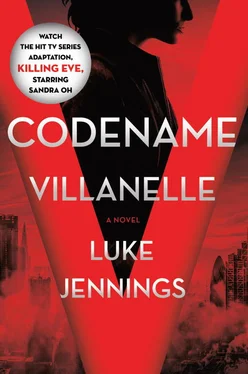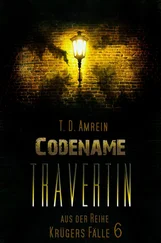“You know she’s a fucking psycho,” said Frank.
“Nobody’s perfect,” said Konstantin.
Two days later Oxana flew to Germany for three weeks’ escape and evasion training at the mountain warfare school in Mittenwald. She was attached to a NATO Special Forces cadre, and her cover story was that she was on secondment from a Russian Interior Ministry counter-terrorism unit. On the second night, while dug into deep snow, she felt stealthy fingers at the zip of her bivvy bag. A silent but furious fight erupted in the darkness, and the following day two of the NATO soldiers were helicoptered off the mountain, one with a severed forearm tendon, the other with a stab wound through the palm of his hand. After that, no one bothered her.
Immediately after Mittenwald, she was flown to a U.S. Army facility in Fort Bragg, North Carolina, where she was put through an advanced Resistance to Interrogation programme. This was calculatedly nightmarish, and designed to induce maximal stress and anxiety in its subjects. Shortly after her arrival Oxana was stripped naked by her male guards and marched to a brightly lit, windowless cell, empty except for a close-circuit camera mounted high on one wall. Time passed, hour after endless hour, but she was given only water, and without toilet facilities was forced to use the floor. Before long the cell stank, and her stomach was twisting with hunger. If she tried to sleep, the cell would reverberate with white noise, or with electronic voices repeating meaningless phrases at ear-splitting volume.
At the end of the second day—or it might have been the third—she was hooded, and led to another part of the building where she was questioned, in fluent Russian and for hours on end, by unseen interrogators. Between these sessions, in which she was offered food in exchange for information, she was forced to adopt agonising and humiliating stress positions. Starved, sleep-deprived and severely disoriented, she drifted into a trance-like state, in which the boundaries between her senses blurred. She managed, nevertheless, to hang on to some vestigial sense of self, and to the knowledge that the experience would come to an end. However terrifying and degrading it turned out to be, it was preferable to life in the secure wing of a Ural Mountains penal colony. By the time the exercise was officially pronounced over, Oxana was beginning, in a deeply perverse way, to enjoy it.
Further courses followed. A month of weapons familiarisation at a camp to the south of Kiev, in Ukraine, followed by three more at a Russian sniper school. This was not the high-profile establishment outside Moscow where the Spetsnaz Alfa and Vympel detachments trained, but a much more remote facility near Ekaterinburg, run by a private security company whose instructors asked no questions. Being back in Russia felt strange to Oxana, even under the false identity provided by Konstantin. Ekaterinburg, after all, was less than two hundred miles from where she had grown up.
It wasn’t long, though, before the deception began to give her a certain heady satisfaction. “Officially, Oxana Vorontsova no longer exists,” Konstantin informed her. “A certificate issued at Perm Regional Clinical Hospital indicates that she hanged herself in her cell at the Dobryanka remand centre. District records show that she was buried at public expense in the Industrialny cemetery. Trust me, no one misses her, and no one is looking for her.”
Severka urban sniper school was built around a deserted town. In Soviet times it had been home to a thriving community of scientists studying the effects of radiation exposure; now it was a ghost town, peopled only by life-sized target dummies, strategically situated behind plate-glass windows and at the wheels of rusting, skeletal vehicles. It was an eerie place, silent except for the wind that whistled between its empty buildings.
Oxana’s basic training was with the standard-issue Dragunov. Soon, though, she graduated to the VSS, or Special Sniper Rifle. With its exceptionally light weight and integral silencer, it was the ideal urban weapon. By the time she left Severka she had fired thousands of rounds under a variety of operational conditions, and in less than a minute was able to arrive at a firing point with the VSS in its polystyrene case, assemble the weapon, zero the sights, calculate windspeed and other vectors, and squeeze off a lethal head or body-shot (“one shot, one kill,” in the words of her instructor) at a range of up to four hundred metres.
Oxana sensed herself changing, and the results pleased her. Her observational ability, sensory skills and reactive speeds had all been extraordinarily enhanced. Psychologically, she felt invulnerable, but then she had always known that she was different from those around her. She felt none of the things they felt. Where others would experience pain or horror, she knew only a frozen dispassion. She had learned to imitate the emotional responses of others—their fears, their uncertainties, their desperate need for affection—but she had never fully experienced them. She knew, however, that if she was to escape notice in the world it was essential to wear a mask of normality, and to disguise the extent of her difference.
She had learnt, very young, that people could be manipulated. Sex was useful in this regard, and Oxana acquired a voracious appetite. Not so much for the act itself, although this had its satisfactions, as for the thrill of pursuit and psychic domination. For lovers, she liked to choose authority figures. Her conquests had included schoolteachers of both genders, a Spetsnaz colleague of her father’s, a young woman from a military academy in Kazan against whom she was competing in the University Games, and most satisfying of all, the psychotherapist she’d been referred to for assessment in her first year at university. Oxana had never felt the slightest need to be liked, but it gave her profound satisfaction to be desired. To see the look in her conquest’s eyes—that final melting of resistance—which told her the transfer of power was complete.
Not that it was ever quite enough. Because for all its fierce excitement, that moment of submission invariably marked the end of Oxana’s interest. The story was always the same, even with Yuliana, the psychotherapist. By yielding to Oxana, by surrendering her mystery, she made herself undesirable. And Oxana simply moved on, leaving the older woman bereft, her personal and professional self-esteem in tatters.
After the sniper course, she learnt about explosives and toxicology in Volgograd, surveillance in Berlin, advanced driving and lock-picking in London, and identity management, communications and coding in Paris. For Oxana, who had never left Russia before her appointment with Konstantin at the Chusovaya Bridge, the international travelling was dizzying. Each course was taught in the language of the country in question, testing her linguistic aptitude to the limit and, more often than not, leaving her mentally as well as physically drained.
Throughout it all, patient and imperturbable on the sidelines, was Konstantin. He maintained a professional distance between himself and Oxana, but was sympathetic towards her on the handful of occasions when the pressure became too much, and she demanded, coldly, to be left alone. “Take a day off,” he told her on one occasion in London. “Go and explore the city. And start thinking about your cover name. Oxana Vorontsova’s dead.”
By November, her training was almost over. She had been staying in a dingy one-star hotel in the Paris suburb of Belleville, and travelling every day to an anonymous office building in La Défense, where a young man of Indian origin was teaching her the finer points of steganography—the science of concealing secret information in computer files. On the final day of the course Konstantin appeared, paid her hotel bill, and accompanied her to an apartment on the Quai Voltaire, on the Left Bank.
Читать дальше












